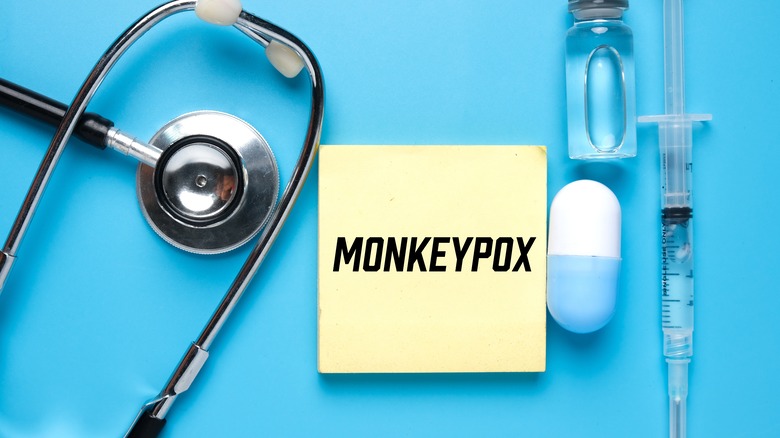Study Reveals Limitations Of Using Antiviral Drugs To Treat Monkeypox
As cases of monkeypox are spreading across Europe, North America, and Australia, it's becoming increasingly necessary to understand treatment options, according to the Centers for Disease Control and Prevention (CDC). Researchers of a new study looked at the use of antivirals for treating monkeypox patients in the U.K. and found their effectiveness may be more limited than they'd hoped.
Monkeypox was first discovered in 1958, occurring in a group of monkeys being used for research, hence the name "monkeypox" (via Cleveland Clinic). It's classified as an orthopoxvirus, a category that also includes the more commonly-known smallpox virus. In humans, it occurs more often in children and can cause flu-like symptoms such as fever, chills, swollen lymph nodes, and muscle aches. This is followed by a rash that appears a few days later, starting as small, raised bumps that eventually turn into blisters, fill with pus, scab over, and fall off. It's typically spread from animal to person, but person-to-person transmission is also possible.
Monkeypox is rare, but in May, 2022, cases have been reported in countries where it's not normally found and in patients with no travel links to places where monkeypox has been known to spread. As of May 20th, the CDC has issued an alert to practice enhanced precautions, although the risk is still low (via CDC).
Discovering the best ways to treat monkeypox
In the new study published in The Lancet Infectious Diseases, researchers in the U.K. analyzed outcomes for seven patients treated for monkeypox between 2018 and 2021. The patients were a mix of men and women who contracted the virus in different ways. Two smallpox medications were administered to treat it: brincidofovir and tecovirimat. However, they weren't specifically approved to treat monkeypox and were being used off label (via U.S. News & World Report).
The study found that one patient who received tecovirimat had a shorter duration of symptoms and viral shedding than the other cases. Viral shedding is the body's way of expelling the virus from the body through coughing, sneezing, or speaking (per Mayo Clinic). Brincidofovir, which was used on four patients, wasn't successful in treating the disease. However, all four patients still made a full recovery from the illness.
Most people who contract monkeypox recover in two to four weeks, according to U.S. News & World Report. In the U.S., tecovirimat has received expanded access approval from the Food and Drug Administration to treat monkeypox. But researchers suggest that larger studies are needed to draw more definitive conclusions.


